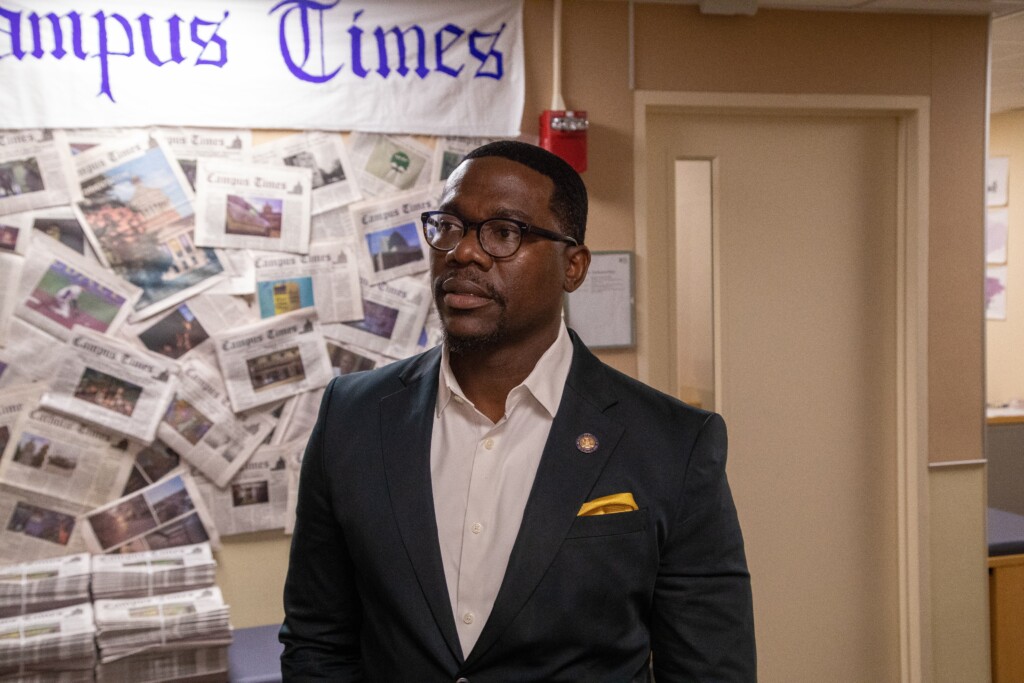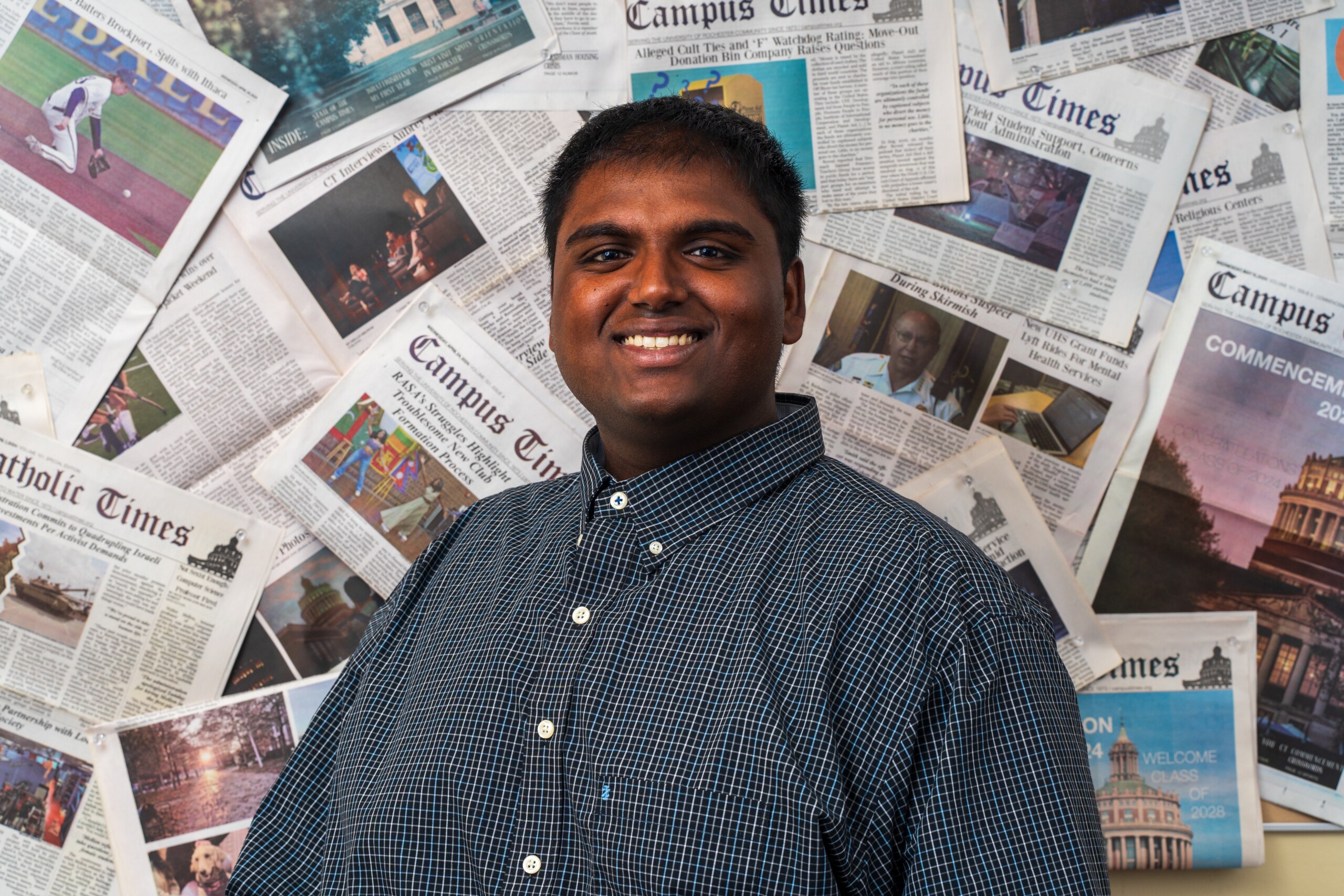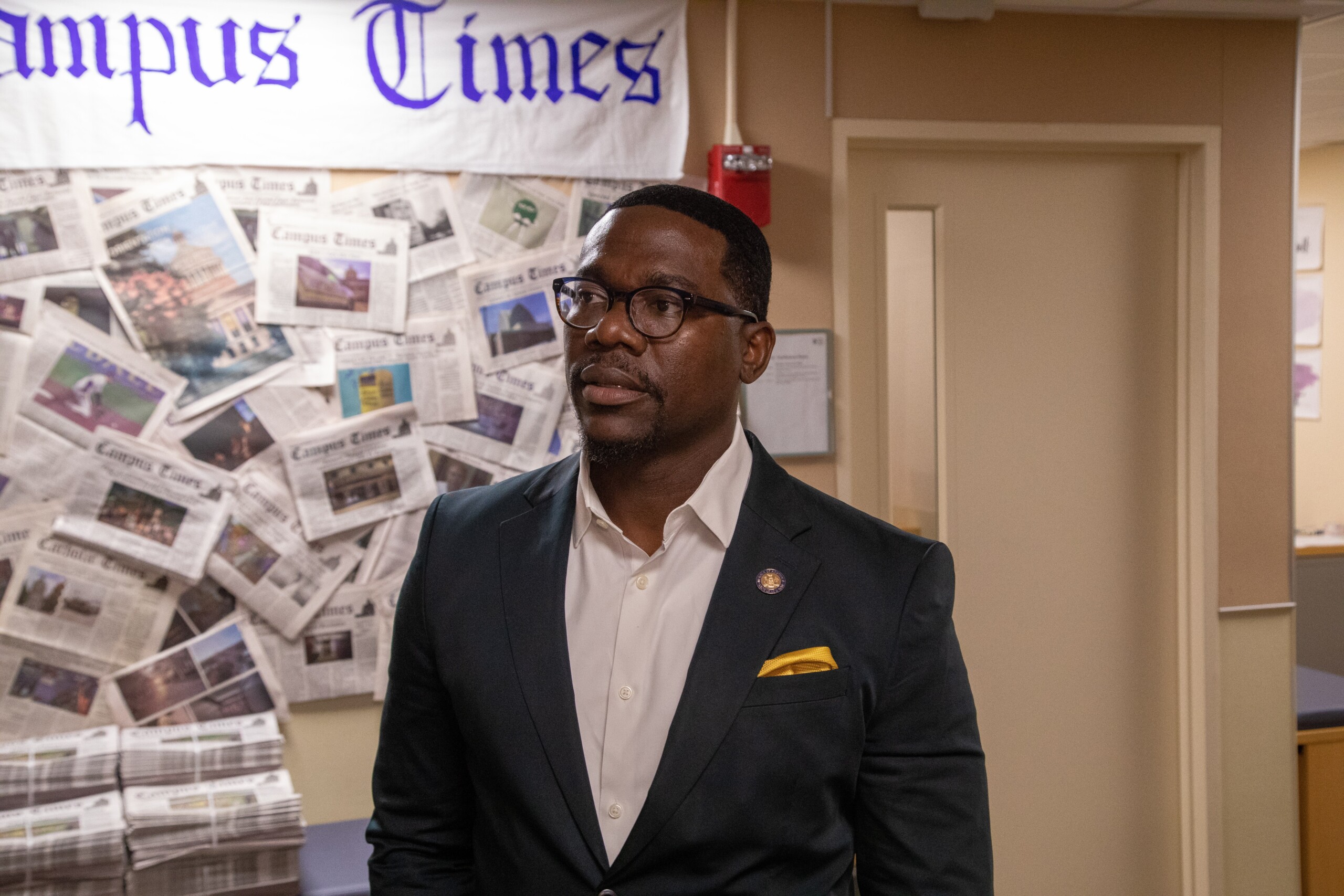The University is in Assembly District 137, which has been represented by Democrat Demond Meeks since the passing of David Gantt (D) in 2020. Despite running unopposed that year, Meeks faced Marcus C. Williams (R) in the previous two elections, winning 67.9% of the vote in 2022.
Both Meeks and Williams sat down with the Campus Times to discuss their background and platform in preparation for next week’s election.
Demond Meeks (D):
Meeks ties his commitment to advocacy back to his roots: growing up on Rochester’s own Hudson Avenue and watching the way his family fought for him — with a mother who joined the Civil Service Employees Association when he was younger.
Meeks began his foray in community organizing in high school, and became an organizer for 1199SEIU, a labor union for healthcare workers.
“[For] a number of the challenges and frustrations that we were dealing with as a community, I felt like all roads went back to Albany [… whether it was] challenges providing some of the same programs and services that I was offered as a child, summer programs, summer employment […] How do we bring those types of programs back? Well, we can sit there and advocate in Albany and bring resources back in those spaces.”
On housing
“One of the things that we passed at the state level was Good Cause [legislation]. Years ago, we talked to [Rochester’s] city council about it and they said ‘you’ve got to do it at the state level.’ […] It’s done [now], and we also implemented it in a manner that City Council could outfit it to benefit the community [they] serve, and that’s not quite happening […] it’s like pulling teeth.”
While Meeks sees Good Cause — which establishes regulations for property owners to abide by when raising rent or evicting a tenant — as a vital first step, his focus also extends to ensuring that financial barriers don’t prevent families from homeownership, where an individual who may not have the best credit or income but pays their rent on time could still find a way to build and own a home.
On healthcare
As an Assembly member, Meeks has sponsored a variety of legislation that seeks to improve healthcare accessibility for New Yorkers, with the most notable being Assembly Bill 7897 that would establish the New York Health program, a comprehensive system of access to statewide healthcare insurance. He has helped pass new legislation where New Yorkers won’t have to pay co-payments for insulin.
“If I could wave a magic wand and everyone can have healthcare free of charge, I think it would be beneficial to everyone across the board. As a labor organizer, I remember days going into facilities, talking with my members, and to see people coming to work; you can see that they’re actually sick […] We live in a society where people literally cannot afford to be sick.”
Meeks also mentioned his support for Assembly Bill A3115, which calls for a progressive statewide income tax.
“I think you have to have a selfless mindset when it comes to paying taxes, but also recognizing that these are ways that we can help benefit [the] masses throughout our community […] It has to be paid for, right? With a progressive income tax that focuses on top-tier earners, I think that would be one of the directions that we could [go] in, [as well as] putting pressure on our federal government to say that this is something that we need across the board.”
On poverty
According to the Rochester-Monroe Anti-Poverty Initiative, Rochester has the highest rate of childhood poverty, the highest rate of extreme poverty, and the second-highest rate of poverty among comparably-sized cities in the nation. During his tenure in Assembly, Meeks supported legislation to both raise the minimum wage and assist women into entering high-demand occupations.
“So many of our challenges as a community tie right back to poverty […] When we have better wages, the money goes a bit further, and it also affords people more time […] I’ve seen it time and time again, where often the case is you have single moms working these hours, sometimes working as travel nurses — they’re making money, but they’re not able to be present.”
For Meeks, raising the minimum wage is one thing, but having a living wage for families is another.
“Before the onset of the pandemic, studies showed that a living wage for a single parent raising two children in Rochester was $18.50 […] Something that I worked on as a member of 1199SEIU, we were intentional in hosting financial literacy workshops [… programs] to help people have a better idea of how to go about spending money and resources, necessities versus wants.”
On the election
When it comes to re-election, Meeks ties his position directly to the identity of the people he’s served since his beginnings.
“Members of the community really want to see the community in a positive light. They want to see clean streets. They want to see less violence […] I belong to the Democratic Party, but I’m a member of this community,” he added. “I also believe wholeheartedly that the power of the people is stronger than the people in power.”
Marcus C. Williams (R):
Williams’ choice to run for Assembly comes from not being heard at the city-level.
“I reached out to city council, and my city council person at the time [said] ‘we’ll take a meeting with you and we’ll talk to you about stuff.’ It was next week, next week […] and tomorrow never came.
That’s not how you’re supposed to be as a representative. You’re supposed to be able to be accessible to the people when they want to reach out to you and engage with them.”
On lowering crime
According to Williams, bail reform is fundamentally misunderstood — and allows juveniles to continue crime without adequate punishment.
“For juveniles, they don’t fingerprint. They don’t mugshot, or any of that. Somebody could have a rap sheet as long as your arm, and every time they get caught, when they go before a judge, it’s like their first time doing a crime.”
He also spoke about jail and prison reform.
“The living conditions in the prisons are terrible […] The food quality, the access to positive, impactful staff, it’s not there. We also need to give the people the ability to work jobs. There’s a lot of companies that have no issues hiring people with records […] They’d be willing to work with prisons to train the people for the jobs while they’re in prison before they get out.”
On the income and state gas tax
Williams mentions other states that don’t have income tax at all. “These are burdens that everybody is facing, but [they’re] also part of our everyday economy. If the money isn’t able to be paid into that, it deteriorates the economy, and we can’t grow and have the positive directional focus that we need as an area.”
Williams also mentioned expanding the state’s capabilities for oil and gas production in tandem with eliminating a state gas tax — building another oil refinery, for one, and proposing ventures into nuclear energy production
“We know that nuclear is clean energy […] If you’re shutting down power plants, but we need the energy, why would you do that? We’re not able to produce enough with wind and solar. It’s a great concept — but the question is, ‘is it practical?’”
To him, wind and solar don’t generate enough output to meet current energy needs. Without being realistic, he says, communities would face the burden.
On accessible housing
Though Meeks largely supports Good Cause legislation, Williams is opposed to it — and would rather see benefits flow to homeowners.
“My alternative to Good Cause is [that] for the first five years of a new home purchase, I’d like it to be tax deferred, where you don’t have to pay tax for the five years […] That helps first-time home buyers and owner-occupants of their property [in terms of] not having to pay that extra expense when really you’re trying to establish yourself.”
On educational and economic opportunity
“We see that charter schools and religious schools are having a boom because what they’re doing is they are preparing children better educationally-wise to be more proficient and to have the option to access better opportunities in the future, be that jobs [or college].”
To Williams, schools with the best outcomes — charter and religious schools, he says — should have the most funding.
On the election
On seeking victory this November, Williams wants to see change in the relationships constituents have with their representatives.
“My job is to represent the people in my community and their concerns,” Williams stated. “I could care less about the political elites or whatever, because [my job] is not to [just] serve the people […] My goal is to serve the people and show them that they matter to me.”



